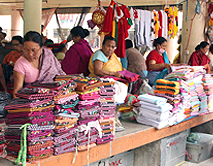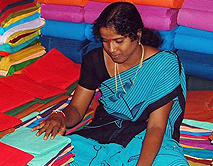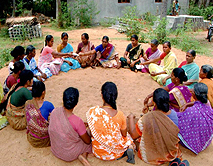
Deen Dayal Antyodaya Yojana (DAY) with an aim to uplift the urban poor folks by enhancing sustainable livelihood opportunities through skill development. Keeping in view the objective of Make in India, Skill Development is essential for socio economic betterment. Deen Dayal Antyodaya Yojana was launched under the Ministry of Housing and Urban Poverty Alleviation (HUPA). Government of India has provisioned Rs.500 crore for the scheme.
The scheme is integration of the National Urban Livelihoods Mission (NULM) and National Rural Livelihoods Mission (NRLM).
National Urban Livelihoods Mission (NULM) is renamed as Deen Dayal Antyodaya Yojana-(DAY-NULM) and in Hindi as - Rashtriya Shahri Aajeevika Mission. Under the scheme urban areas extends the coverage to all the 4041 statutory cities and towns, there by covering almost the entire urban population. Currently, all the urban poverty alleviating programmes covered only 790 towns and cities.

To reduce poverty and vulnerability of the urban poor households by enabling them to access gainful self employment and skilled wage employment opportunities, resulting in an appreciable improvement in their livelihoods on a sustainable basis, through building strong grassroots level. The mission would also aim to providing the shelter equipped with essential services to the urban homeless in a phased manner. The scheme also address the livelihood concern of the urban street vendors by facilitating with suitable space, institutional credit, and social security and skills to the urban street vendor for accessing emerging market opportunities.
Component of DAY-NULM
The scheme has two component one for urban India and other for rural India.
- The Urban component named as Deen Dayal Antyodaya Yojana will be implemented by the Ministry of Housing and Urban Poverty Alleviation.
- The rural component named as Deen Dayal Upadhyaya Grameen Kaushalya Yojana will be implemented by the Ministry of Rural Development.
Main highlights of the scheme
- Employment through Skill Training and Placement - An expenditure of Rs.15, 000 per person is allowed on training of urban poor which is Rs.18, 000 in North-East and J&K. Moreover, Training urban poor to meet the enormous demand from urban citizens by imparting market-oriented skills through City Livelihood Centers.
- Social Mobilization and Institution Development - It will be done through formation of Self-Help Groups (SHG) for training members and hand holding, an initial support of 10, 000 is given for each group. Assistance of Rs.50, 000 is provided to Registered Area Level Federations.
- Subsidy to urban poor - An interest subsidy of 5% - 7% for setting up individual micro-enterprises with a loan of up to 2 lakh and for group enterprises with a loan limit of up to Rs.10 lakhs.
- Shelters for urban homeless - Cost of construction of shelters for urban homeless is fully funded under the Scheme.
- Other means - Development of vendor markets and also the promotion of skills for the vendors through setting up infrastructure and special projects for the rag picker and differently abled etc.

- Ownership and productive involvement of the urban poor and their institutions in all processes
- Transparency in programme design and implementation, including institution building and capacity strengthening
- Accountability of government functionaries and the community
- Partnerships with industry and other stakeholders
- Community self-reliance, self-dependence, self-help and mutual-help
Guiding Principles
- The core belief of National Urban Livelihoods Mission (NULM) is that the poor are entrepreneurial and have innate desire to come out of poverty. The challenge is to unleash their capabilities to generate meaningful and sustainable livelihoods.
- NULM believes that any livelihood promotion programme can be scaled up in a time bound manner only if driven by the poor and their institutions. Such strong institutional platforms support the poor in building up their own human, social, financial, and other assets. This in turn, enables them access to rights, entitlements, opportunities and services from the public and private sectors, while enhancing their solidarity, voice and bargaining power.
- As per the Constitution (74th Amendment) Act, 1992, urban poverty alleviation is a legitimate function of the Urban Local Bodies (ULB). Therefore, ULBs would need to undertake a lead role for all issues and programmes concerning the urban poor in cities/towns, including skills and livelihoods.
- NULM would aim at universal coverage of the urban poor for skill development and credit facilities. It will strive for skills training of the urban poor for market-based jobs and self-employment, facilitating easy access to credit.
- Street vendors constitute an important segment of the urban population. Street vending provides a source of self-employment, and thus acts as a measure of urban poverty alleviation without major Government intervention. They have a prominent place in the urban supply chain and an integral part of the economic growth process within urban areas. NULM would aim at facilitating access to suitable spaces, institutional credit, social security and skills to the urban street vendors for accessing emerging market opportunities. Accordingly, NULM would aim at providing shelter equipped with essential services to the urban homeless in a phased manner.
- NULM would place a very high emphasis on convergence with schemes/programmes of the relevant line Ministries/Departments and programmes of state governments dealing with skills, livelihoods, entrepreneurship development, health, education, social assistance, etc. An alliance strategy will be sought with all concerned departments to promote skills training of rural-urban migrants as a bridge the gap between the livelihoods of the rural and urban poor.
- NULM would aim at partnership with the private and civil society in providing shelters, skill training, and also in facilitating technological, marketing and hand holding support for the urban poor entrepreneurs who want to be self-employed and set up their own small businesses or manufacturing units.

The Ministry had developed an online web based Management Information System (MIS) for the purpose of monitoring real time and regular progress of the scheme. MIS was launched on 20 January 2015.MIS also enables stakeholders such as training providers, certification agencies, banks, resource organizations to feed required information directly which can be accessed by urban local bodies, States and Ministry of HUPA for monitoring and other purposes and to track the progress.
Moreover, for effective monitoring of the implementation of the scheme DAY-NULM Directorate regularly conduct review meetings and video conferences with the State/UTs.
Related Links
- Monitoring System for Skill Development Scheme
- Ministry of Housing and Urban Poverty Alleviation
- Ministry of Social Justice and Empowerment
- Ministry of Rural Development
- National Urban Livelihoods Mission
- National Rural Livelihoods Mission





